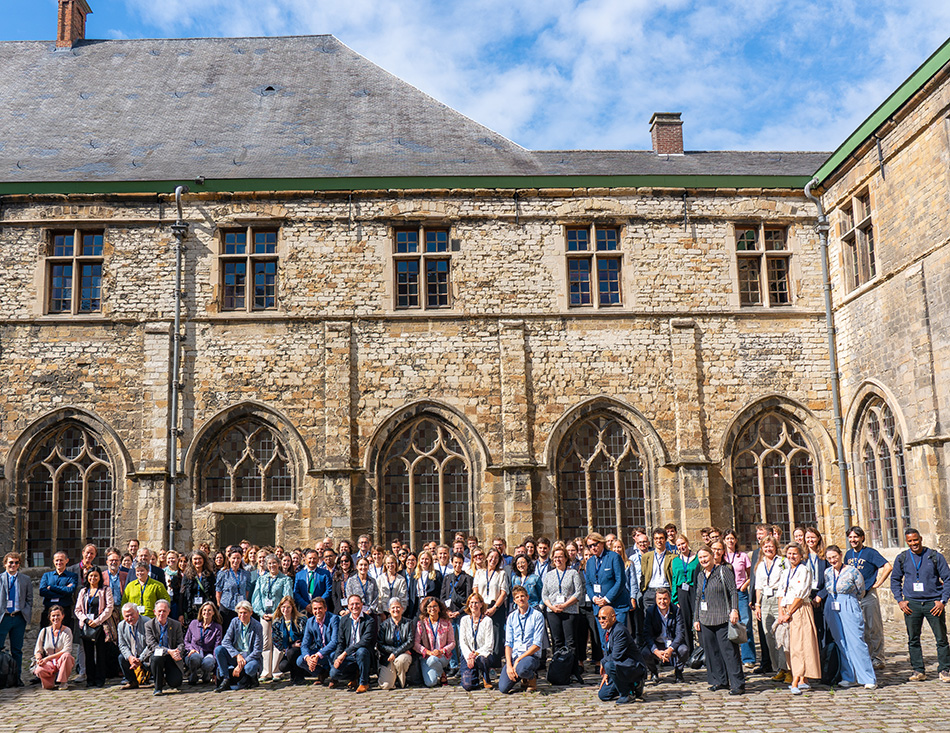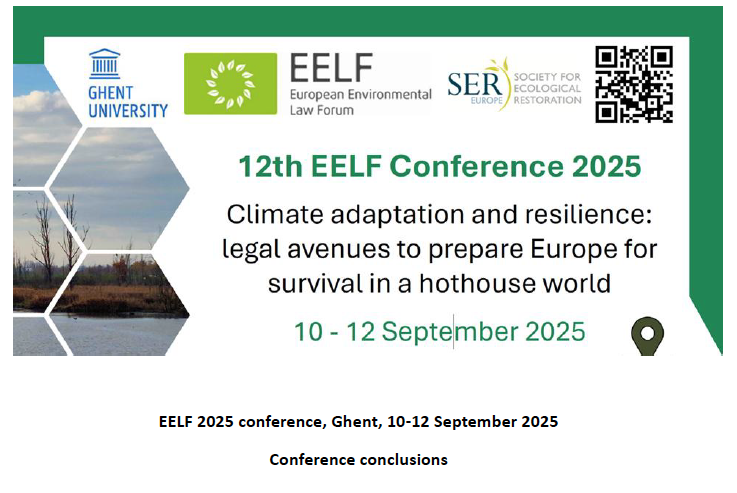Welcome
The EELF annual conference is meant to be the major annual assembly of European Environmental Law scholars and practitioners. It provides a unique opportunity to meet colleagues from across Europe and to discuss topical issues of environmental law development and implementation. The conference combines plenary keynotes, parallel sessions and an attractive social programme.
The 12th 2025 Conference is hosted by Ghent University and will be dedicated to climate adaptation and resilience.


Welcome!
The EELF annual conference is meant to be the major annual assembly of European Environmental Law scholars and practitioners. It provides a unique opportunity to meet colleagues from across Europe and to discuss topical issues of environmental law development and implementation. The conference combines plenary keynotes, parallel sessions and an attractive social programme. It is addressed to both experienced senior experts and younger colleagues. The 12th Conference 2025 is hosted by Ghent University and will be dedicated to climate adaptation and resilience.
Conference theme:
2024 is now certain to be the hottest year on record, and the first in which average global temperatures exceed 1.5 degrees Celsius above the 1850-1900 pre-industrial period. Extreme climate events such as heatwaves, drought and flooding are occurring with increasing severity and frequency, also in Europe. While greenhouse gas emissions in the EU fell by 8% in 2023, mainly thanks to the boom in renewables, other parts of the world will continue to burn carbon and fossil fuels for the years to come. This renders a scenario more likely in which more torrential downpours, hurricanes, floods but also droughts and heatwaves will become a recurring challenge, also in many parts of Europe, for the decades to come. Economic losses from extreme climate-related events in the EU have averaged €26 billion per year over the last decade. Inaction, too, has a cost: exposing today’s EU economy to global warming of 1.5 to 3°C above pre-industrial levels would result in an annual economic loss of between €42 and €175 billion. While stopping the burning of fossil fuels remains crucial, climate adaptation will be indispensable, with the potential of saving hundreds, possibly thousands of lives while also generating many jobs as well as providing other societal benefits.
The EU published its first Adaptation Strategy in 2013 and another in 2021, confirming the EU’s high vulnerability to climate change. Member States decide their own implementation approaches. However, while the overall EU framework for adaptation appears to be sound in terms of focus, a 2024 report of the Court of Auditors found that national climate adaptation policies often include conflicting priorities. The report also found that Member States’ reporting on climate adaptation was largely insufficient, whereas the surveyed municipalities were often unaware of the existing climate adaptation strategies. A screening of a sample of climate adaptation projects moreover revealed that
more than a third of these projects had no tangible impact on increasing adaptive capacity, whereas some might even lead to maladaptation.
It is thus self-evident that climate adaptation will have to move to the forefront of the Member States’ environmental and urban planning strategies in the decades to come. In a hothouse world, we will no longer have the luxury to wait and see. Stepping up existing climate adaptation efforts, will be a fundamental policy challenge. However, it is clear that prioritizing climate adaptation also raises a multitude of legal questions linked to, amongst others, climate law, disaster law, biodiversity and nature restoration law, urban planning, agricultural and fisheries policies, human rights law, intergenerational justice, property law etc.
Accordingly, the EELF Conference 2025 in Ghent is focusing on the role that the law will have to play in stimulating the much-needed paradigm shift towards climate adaptation in the EU.
See you in Ghent.
The Organising Committee,
An Cliquet, Hendrik Schoukens, Geert Van Hoorick, Kristien Ballegeer
Congress organiser: Semico nv - Seminar and congress organisation Office nv - BE0450 807 597 - Korte Meer 16, 9000 Gent Belgium

